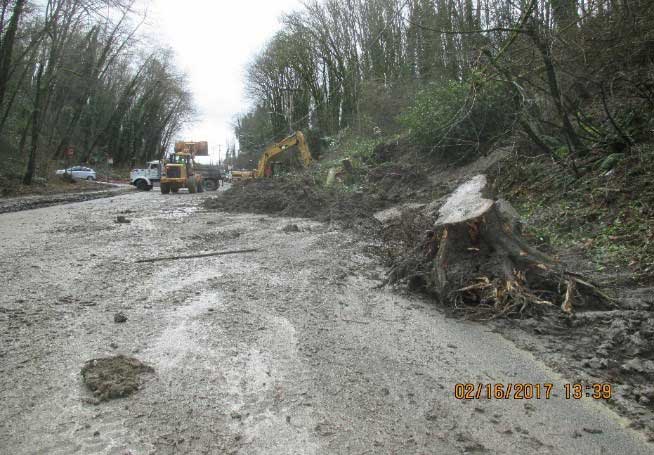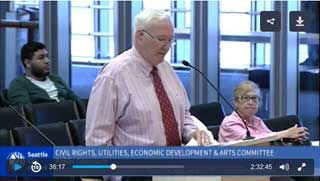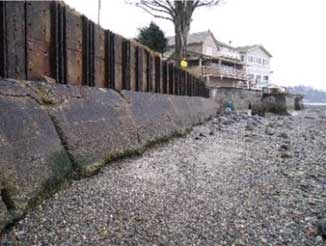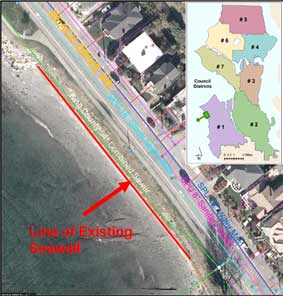MHA DEIS Issues for District 1; Landslide Mitigation Funding; Fair Chance Housing Legislation; Code Interpretations No Longer Required; Southwest Precinct Community Picnic; Alki Seawall; Results: 2017 Your Voice, Your Choice Parks and Streets
MHA DEIS Issues for District 1
Last week I encouraged you to get your comments on the Mandatory Housing Affordability (MHA) Citywide Rezone Draft Environmental Impact Statement (DEIS) into the Office of Planning and Community Development before the Monday 8/8 deadline. I hope that you did. I also let you know that I was working with Councilmember Johnson on a formal comment from the entire City Council on the DEIS. Instead the Planning Land Use and Zoning committee sent the letter. You can read it here. In the letter, I included District 1-specific concerns that I’ve heard from constituents in the West Seattle Junction, Westwood-Highland Park, South Park, and Morgan Junction. I also used the letter to confirm the commitments OPCD had made to me previously to a. more detailed quantitative analysis of displacement impacts on people-of-color, b. a more qualitative analysis of cultural displacement, both disaggregated to the neighborhood level, and c. to share the draft Final EIS with Council prior to publication.
$1.37 Million in Landslide Mitigation Funding – Including 3 District 1 Projects – Approved by Council
The Council approved an additional $1.37 million for landslide mitigation as a result of a request I made to the City Budget Office and wrote about a few weeks ago. Three of those projects are in West Seattle, at SW Cambridge Street and California Avenue SW, the 10200 block of 47th Avenue SW, and Highland Park Way SW, south of SW Holden Street. The latter location, pictured below, was featured in a May Find-It-Fix-It community walk.
Background on the City’s landslide planning and pictures of affected locations are available here.
The Office of Sustainability & Environment just released a reporting on Preparing for Climate Change, which notes the increased potential for landslides resulting from climate change.
Fair Chance Housing Legislation
On Tuesday my committee – Civil Rights, Utilities, Economic Development, and Arts – recommended approval of the Fair Chance Housing ordinance by a 6-0 vote. The legislation, sponsored by myself and Council President Harrell, prohibits landlords from screening applicants based on past arrests or criminal convictions. The bill was developed to address barriers people with criminal backgrounds face when attempting to secure rental housing. I’ve written about a few times before, you can read those here, and here.
Today, largely because of the new access to data that historically has been less accessible, landlords can reject tenants because they’ve been arrested in the past seven years – not convicted – arrested. For a criminal justice system that disproportionately arrests people of color, punishing someone who hasn’t been found guilty is a true injustice. For those who have been convicted, the way I see it, you’ve paid your debt to society if you’ve served your time. Blocking formerly incarcerated people from accessing stable housing is an extrajudicial punishment not consistent with the rule of law. It is also a recipe for recidivism and less safety for our communities. Recidivism decreases when people are able to access housing. I would expect anyone in favor of a safer Seattle to support this bill. If you are interested in reviewing the studies that support the policy as developed in the Fair Chance Housing ordinance, you can find them here.
Further, we are in a homelessness state of emergency. If we do not do more to ensure housing providers provide housing for the 55% of unsheltered homeless people in Seattle who identify their criminal background as a barrier to accessing housing, then we are derelict in our duty to address the homelessness state of emergency – for which we have the authority and obligation to act with expedience.
The Fair Chance Housing ordinance would prevent landlords from screening applicants based on criminal convictions; arrests that did not lead to a conviction; convictions that have been expunged, vacated or sealed; juvenile records; or status of a juvenile tenant on the sex offender registry. The bill also prohibits the use of advertising language that categorically excludes people with arrests or conviction records. The legislation does not apply to people registered as sex offenders who committed their crime as an adult. In addition, the legislation will not go into effect for 150 days after signing in order to support a new Fair Housing Home Program in which the City will help landlords learn how they can implement practices that will affirmatively further fair housing by reducing racial and other biases in tenant selection.
Landlords will still be able to screen applicants based on employment, credit scores, income ratios, or other criteria to ensure people will be good tenants. They’ll merely be unable to use criminal history when considering applicants, something no study has shown affects a person’s ability to successfully be a good neighbor or tenant. I hope my colleagues will join me in supporting this legislation when it comes to Full Council this Monday.
The legislation recommended by committee today was developed collaboratively over the past year through a stakeholder process that included renters, landlords, advocates, the Office of Mayor Ed Murray, and the Seattle Office for Civil Rights. The bill was considered in my committee at over 4 meetings, including a stakeholder discussion and an evening forum highlighting feedback from formerly incarcerated people, tenant advocacy organizations, and the Rental Housing Association.
The voices of people with lived experiences have been very important to the development and passage of this legislation. We all know that one in three people in Seattle have a criminal background. But the reality is that, no matter how many facts and figures exist, what actually convinces elected officials to change the law are these lived experiences. They are worth more than all the studies combined. It takes incredible courage to speak in public about one’s experiences with the criminal justice system and I want to acknowledge those who have, here is the testimony of one such person.
In addition, a District 1 West Seattle constituent and 25 year veteran, who works with incarcerated veterans, joined us to give testimony as well. Until Tuesday morning, I had been considering abstaining on the amendment to remove the 2 year look back. I was so moved by the testimony of this gentleman, I was convinced to support the amendment. Here is an excerpt:
“For the past 7 years, I’ve been working with incarcerated veterans as they struggle to restart their lives. I’ve come to know senior leadership in both the Department of Corrections & the Washington State Department of Veteran Affairs. I offer my comments here today speaking for neither of those institutions nor any of the dedicated hardworking folks I’ve come to know there. Rather, I speak for myself, one who served 25 years defending the right of my fellow citizens to exist within a free open society. As a nation, we have institutionalized and legalized discrimination against felons. Their punishment doesn’t stop with their release, it just goes on and on, often for years. It’s been reported we have, per capita, incarcerated more people in our country, than in any democracy in the world. The home of the free, land of the brave, perhaps we should now add & “the incarcerated.” We had heeded the voices of others within our society, who have and continued to wish to marginalize and beat down those who are at their most vulnerable, those in need of our greatest support, our greatest understanding and compassion, those who bear the mark of felon. Yes, felons have transgressed but now they have served their time, paid their dues to society. If they are free to walk our streets then the fact they had been a felon should cease to be public knowledge the minute they are released – not two years after the fact, not seven years after the fact but the moment they are released. Now treat them for who they are today, not who they have been. Folks change, lives change, reality changes. We need to be charitable and supportive, not mean and vindictive. We expect this for ourselves, I certainly do. I know you do as well, why do we insist on denying it to our fellow citizens? Have the political courage to stop listening to those meaner, vindictive, judgmental voices.”
Full Council is scheduled to consider the legislation this Monday, August 14 at 2 p.m. in City Council Chambers.
Code Interpretations No Longer Required
On Monday, the Council unanimously passed a bill to remove the requirement that an administrative remedy called a “Land Use Code Interpretations” would be required prior to seeking to appeal to the Hearing Examiner or a court of law. A Land Use Code Interpretation is an onerous financial barrier to many people, at a minimum cost of at least $3,150 that accounts for 10 hours of review by Seattle Department of Construction and Inspection (SDCI). There is an additional charge of $315 per hour for any additional review.
This issue was originally brought to my attention when several residents of District 1 appealed a decision regarding a Pondarosa Pine. Which you can read about here in a previous blog post from last year.
In speaking to our Law Department regarding this section of the code, I learned that Seattle is the only jurisdiction in the State that requires administrative remedies be exhausted prior to seeking an appeal. This furthered my resolve and I pushed forward in May with legislation to reverse this.
On July 18th at the Planning, Land Use, and Zoning Committee we had a Public Hearing about this issue, the testimony was overwhelmingly in support of the change. Thank you so those of you that came to testify and bring about this change.
Southwest Precinct Community Picnic
The Southwest Precinct Community Picnic will be on August 12, from 11am – 3pm at the Delridge Community Center at 4501 Delridge Way SW. Precinct Picnics give neighbors an opportunity to come together and enjoy an afternoon with officers in their precinct. Photos from the Southwest Precinct Picnic in 2016 are here.
Council Passes Alki Coastal Erosion Project Agreement for New Seawall at Emma Schmitz Memorial Overlook Park
The Council passed an agreement between the City’s Parks Department and the US Army Corps of Engineers to replace the seawall at Emma Schmitz Memorial Overlook Park by Beach Drive. The seawall was originally built in 1927, and is nearing the end of its useful life; it has a 30% probability of failure during a storm event, and by 2025 will have a 60% probability of failure. It’s 500 feet long, and supports important infrastructure, including a sewer main, a PSE gas line, a storm sewer main, and a water main.
The estimated cost is $2.8 million; the agreement provides for 65% federal funding, and 35% from Parks (approximately $1 million). After detailed design and permitting are completed, construction is anticipated for Autumn of 2018, with completion by Spring 2019.
I asked whether the design accounts for climate change and sea level rise; the Project Management Plan notes that the new seawall “will be two feet higher than the existing structure “to account for increased storm wave heights and future sea-level rise.”
Earlier this month, the Office of Sustainability & Environment released a Preparing for Climate Change report, which noted this seawall as being at risk from sea level rise.
The report notes that sea level rise increases the potential for overtopping of seawalls, and notes that “newer seawalls and other structures have been designed to accommodate projected sea level rise.”
Here’s a presentation and the Environmental Assessment.
Seattle Public Utilities has a map showing areas in Seattle most likely to be affected by sea-level rise.
Thanks to Councilmember Juarez, Chair of the Parks, Seattle Center, Libraries and Waterfront Committee, for
shepherding the legislation through committee.
2017 Your Voice, Your Choice Parks and Streets Vote Results
The Department of Neighborhoods announced results for the 2017 voting results for the Your Voice, Your Choice: Parks and Streets. Here are the winning projects in District 1:
- Delridge: Crossing Improvements at Delridge Way SW & SW Oregon St (Cost: $90,000, Total Votes: 477)
- Westwood/Highland Park: Bus Stop Improvements at Delridge Way SW & SW Barton St (Cost: $90,000, Total Votes: 470)
- High Point: Walkway Improvements on SW Orchard St between Delridge Way SW & Sylvan Way SW (Cost: $80,081, Total Votes: 425)
- South Park: Crossing Improvements on S Cloverdale St (Cost: $85,700, Total Votes: 396)
SDOT also noted it will be funding some of the additional projects considered but not funded through this process. It gives us something to which to look forward:
“As a bonus, while Seattle Department of Transportation (SDOT) reviewed ideas submitted by Your Voice, Your Choice participants, it ran the projects through its program priorities and was able to fund additional traffic calming and pedestrian improvement projects in underserved neighborhoods throughout the City. SDOT will work with communities to announce, design, and implement these projects in the upcoming year.”
Information about the District 1 projects is linked here.
Posted: August 11th, 2017 under Civil Rights, Councilmember Herbold, District 1, Homelessness, Housing, Housing Discrimination, Office of Police Accountability, Parks and Recreation, Seattle Public Utliities, Transportation
Tags: Alki, Fair Chance Housing, landslide





